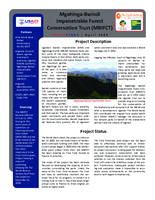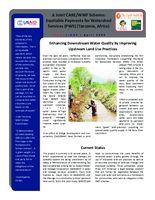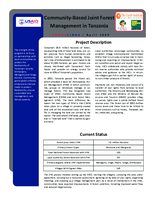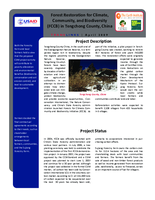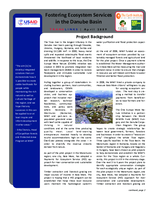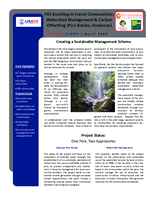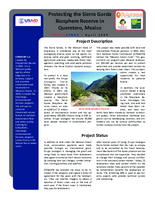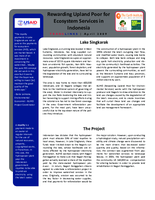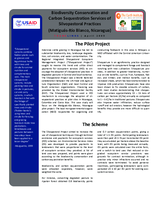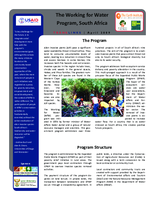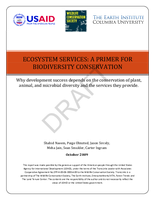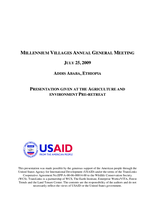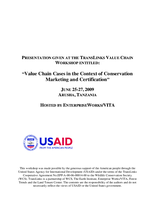The Earth Institute
Mgahinga Bwindi Impenetrable Forest Conservation Trust
Uganda’s Bwindi Impenetrable (BINP) and Mgahinga Gorilla (MGNP) National Parks protect some of the most biologically diverse tropical forests in East Africa. Both parks conserve rare montane and alpine forests.
Joint CARE WWF Scheme: Equitable Payments for Watershed Services, Tanzania, Africa
In an effort to bridge development and conservation, CARE/WWF have formed a joint partnership, exclusively establishing the first corporate framework supporting Payments for Watershed Services (PWS)
Community Based Joint Forest Management in Tanzania
The strength of this program is its focus on partnerships with local communities to protect the biodiversity of Tanzania’s Arusha, Kilimanjaro, Morogoro and Tanga districts. Community participation informs all decisions that are made to protect biodiversity, ensure sustainable land management, and reduce poverty.
Forest Restoration for Climate, Community, and Biodiversity in Tengchong County, China
Both the Forestry Farm and local farmers hold a view that the proposed CDM project activity will contribute to poverty alleviation and environmental benefice (biodiversity conservation and soil erosion control), and lead to sustainable development.
Fostering Ecosystem Services in the Danube Basin
The One Europe More Nature (OEMN) initiative was created in 2003 to promote integrated river basin management (IRBM) in order to restore floodplains and stimulate sustainable rural development in the region.
PES Bundling in Forest Communities: Watershed Management and Carbon Offsetting, Pico Bonito, Honduras
The Earth Institute Brief on the Pico Bonito community initiatives which strive to accomplish: 1) the stimulation of local economies; 2) community‐level conservation; 3) promotion of sustainable livelihoods; and 4) community‐ level management and empowerment
Protecting the Sierra Gorda Biosphere Reserve in Queretaro, Mexico
In 2003, Mexico's National Forest Commission (CONAFOR) started the "Mexican Forest Fund". This government run program pays Mexican landowners $30‐$40 per hectare per year to protect watershed and provide watershed services by keeping their forest cover intact. This compensation creates a real opportunity for local residents to preserve forests
Rewarding Upland Poor for Ecosystem Services in Indonesia
RUPES (Rewarding Upland Poor for Environmental Services) works with the hydropower producer and Nagaris to draw attention to the land use changes caused by the degradation of the lake’s resources, and to create incentives that will curtail these land use changes and facilitate the development of an appropriate land use management framework .
Biodiversity Conservation and Carbon Sequestration Services of Silvopastoral Practices, Matiguás Río Blanco, Nicaragua
The Silvopastoral Project aimed to increase the use of silvopastoral techniques through technical assistance and payments for ecosystem services (PES) schemes
Working for Water Program, South Africa
The aim of the program is to eradicate invasive plants that pose a direct threat not only to South Africa’s biological diversity but also to its water security.
Ecosystem Services: A Primer for Biodiversity Conservation - Why development success depends on the conservation of plant, animal, and microbial diversity and the services they provide.
This primer is designed to help clarify what ecosystem services are, what is meant by biodiversity, why the two are inextricably linked, and how sustainable development is ultimately tied to these concepts.
TransLinks and the Millennium Villages
TransLinks and the Millennium Villages
Biogeochemical Ecosystem Services
Millenium Villages annual general meeting July 25, 2009 Addis Ababa, Ethiopia Pesentation given at the agriculture and environment pre-retreat
Ecological regulation of ecosystem services
Presentation given at the TransLinks value chain workshop entitled: “Value Chain Cases in the Context of Conservation Marketing and Certification” June 25-27, 2009 Arusha, Tanzania


